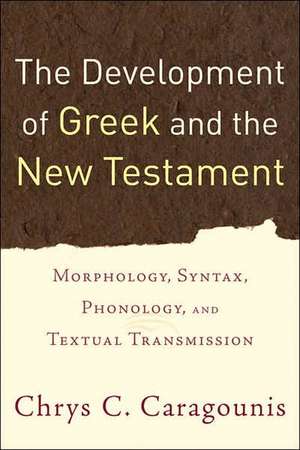The Development of Greek and the New Testament: Morphology, Syntax, Phonology, and Textual Transmission
Autor Chrys C. Caragounisen Limba Engleză Paperback – 31 dec 2006
Preț: 452.62 lei
Preț vechi: 497.39 lei
-9% Nou
Puncte Express: 679
Preț estimativ în valută:
86.62€ • 88.71$ • 72.05£
86.62€ • 88.71$ • 72.05£
Carte tipărită la comandă
Livrare economică 18 martie-01 aprilie
Preluare comenzi: 021 569.72.76
Specificații
ISBN-13: 9780801032301
ISBN-10: 080103230X
Pagini: 732
Dimensiuni: 160 x 227 x 39 mm
Greutate: 0.98 kg
Ediția:Pbk W/Correctio.
Editura: Baker Academic
ISBN-10: 080103230X
Pagini: 732
Dimensiuni: 160 x 227 x 39 mm
Greutate: 0.98 kg
Ediția:Pbk W/Correctio.
Editura: Baker Academic
Textul de pe ultima copertă
"Chrys Caragounis is in an enviably unique position to write a book on the history of the Greek language and the New Testament's place in that story because he is an expert linguist and grammarian highly competent in and familiar with contemporary biblical scholarship as well as having Greek as his mother tongue. He writes with erudition, perceptiveness, and passion. This highly readable survey is a veritable mine of information and detailed scholarship and is to be highly recommended to all scholars of the Greek New Testament."
--J. K. Elliott, University of Leeds
""The Development of Greek and the New Testament" is a magisterial work that must be on the bookshelf of every scholar working with the Greek language. It is a treasure trove of information on all aspects of the historical development of Greek (the evidence presented on Phrynichos, Moiris, and the Atticistic reaction, e.g., is invaluable). Especially significant is the attention paid to Byzantine-Medieval Greek (AD 600-1500) and its place in the development of Neohellenic. While Caragounis has his own views on a number of issues, his approach is in no way idiosyncratic, building as it does on the foundational work of Hatzidakis and Jannaris."
--James W. Voelz, Concordia Seminary
"I have great sympathy with the concerns of Prof. Caragounis and admiration for his extensive reading of the Greek literature of all ages and the perspectives he derives therefrom. This impressive work can open the eyes of New Testament scholars to important but neglected aspects of the language of the New Testament and broaden their linguistic horizons."
--Peter W. van der Horst, University of Utrecht
"Caragounis proposes that earlier and later forms of Greek are essential to a proper understanding of New Testament Greek. He rejects the current scholarly consensus of synchronic priority in favor of diachronic, holistic study of Greek as a unified language. As a result, he proposes alternative interpretations of selected New Testament passages and textual problems. The thesis that Neohellenic (modern Greek) is essential for understanding the language of the New Testament is controversial, and many of us may be skeptical of such claims, but I am glad to see this work made available in an affordable edition so that its proposals may be more readily evaluated."
--Rodney J. Decker, Baptist Bible Seminary
--J. K. Elliott, University of Leeds
""The Development of Greek and the New Testament" is a magisterial work that must be on the bookshelf of every scholar working with the Greek language. It is a treasure trove of information on all aspects of the historical development of Greek (the evidence presented on Phrynichos, Moiris, and the Atticistic reaction, e.g., is invaluable). Especially significant is the attention paid to Byzantine-Medieval Greek (AD 600-1500) and its place in the development of Neohellenic. While Caragounis has his own views on a number of issues, his approach is in no way idiosyncratic, building as it does on the foundational work of Hatzidakis and Jannaris."
--James W. Voelz, Concordia Seminary
"I have great sympathy with the concerns of Prof. Caragounis and admiration for his extensive reading of the Greek literature of all ages and the perspectives he derives therefrom. This impressive work can open the eyes of New Testament scholars to important but neglected aspects of the language of the New Testament and broaden their linguistic horizons."
--Peter W. van der Horst, University of Utrecht
"Caragounis proposes that earlier and later forms of Greek are essential to a proper understanding of New Testament Greek. He rejects the current scholarly consensus of synchronic priority in favor of diachronic, holistic study of Greek as a unified language. As a result, he proposes alternative interpretations of selected New Testament passages and textual problems. The thesis that Neohellenic (modern Greek) is essential for understanding the language of the New Testament is controversial, and many of us may be skeptical of such claims, but I am glad to see this work made available in an affordable edition so that its proposals may be more readily evaluated."
--Rodney J. Decker, Baptist Bible Seminary






